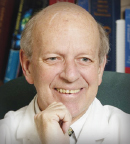John Bartlett, MD, a visionary physician-scientist and pioneer in HIV/AIDS study and treatment who built the infectious diseases division at The Johns Hopkins, died on January 19, 2021, in New York. He was 83 years old.
“Over his long and illustrious career, John Bartlett epitomized the best of Johns Hopkins. He was a brilliant researcher in more than one scientific area, a skilled and caring clinician, and a charismatic and devoted educator,” said Paul B. Rothman, MD, Dean of the Medical Faculty and Chief Executive Officer of Johns Hopkins Medicine. “Anyone who spent time with him was struck not only by his energy, but the kindness and joy he brought to every interaction.”

John Bartlett, MD
From Cardiology to Infectious Diseases
Dr. Bartlett was born on February 12, 1937, in Syracuse, New York. A 1959 graduate of Dartmouth College, Dr. Bartlett received his medical degree at the State University of New York (SUNY) College of Medicine (now known as SUNY Upstate Medical University College of Medicine) in Syracuse in 1963. Initially wanting to become a cardiologist, he did postdoctoral training at the Harvard University–affiliated Peter Bent Brigham Hospital in Boston and the University of Alabama in Birmingham, where he studied cardiac surgery.
During the Vietnam War, he was assigned from 1965 to 1967 to the Third Field Hospital in Saigon as a Captain in the Army Medical Corps. It was there that his interests turned to infectious diseases. After his military service, Dr. Bartlett worked at a Los Angeles veterans hospital and then joined the University of California in Los Angeles (UCLA) faculty. He moved to Tufts University’s New England Medical Center in 1975, and, in 1980, he was recruited to Johns Hopkins to become Chief of its then-small Infectious Diseases Division.
In the 26 years that Dr. Bartlett led the Johns Hopkins University School of Medicine’s Division of Infectious Diseases—from 1980 to 2006—it grew from just 3 full-time staff members and a budget of $200,000 to one of Johns Hopkins’ largest divisions, with a roster of 55 faculty members, a staff of 177, and a research budget of $40 million. By the time Dr. Bartlett stepped down, the division was treating more than 5,100 patients annually with the latest in medication protocols, many of which he helped validate through clinical trials.
“John Bartlett was a giant in the field of infectious diseases, a visionary who anticipated all the most exciting developments and led the efforts to combat foes from HIV to antimicrobial resistance,” stated David Thomas, MD, MPH, current Director of the Division of Infectious Diseases.
Focus on HIV/AIDS
At the Johns Hopkins Hospital in 1984, Dr. Bartlett, along with his colleague, epidemiologist B. Frank Polk, MD, MSc, cofounded the country’s second HIV/AIDS clinic, which has become one of the world’s preeminent HIV/AIDS treatment centers.
A seemingly tireless physician and researcher, Dr. Bartlett was famous for arising each day at 2:00 AM to begin his work. During his time at Johns Hopkins, he put in 100-hour workweeks treating patients with HIV/AIDS; administering trials of potential medications; answering questions from other physicians nationwide; teaching, lecturing, and serving on national committees and organizations; and writing hundreds of scientific articles, books, and chapters. Dr. Bartlett’s Medical Management of HIV Infection, first published in 1994 and now in its 17th edition, and A Pocket Guide to Adult HIV/AIDS Treatment (now called the Bartlett Pocket Guide to HIV/AIDS Treatment), written in the early 1990s and currently in its 19th edition, remain the definitive textbooks on HIV clinical care. In addition to his skills as a speaker and writer, Dr. Bartlett was acclaimed for the compassion he showed his patients with HIV/AIDS.
Among the many honors that Dr. Bartlett received were the Alexander Fleming Award for lifetime achievement from the Infectious Diseases Society of America and the Maxwell Finland Award from the National Foundation for Infectious Diseases for outstanding research and treatment accomplishments. Both were bestowed in 2005.
‘The William Shakespeare of Infectious Diseases’
“In many respects, John Bartlett was the William Shakespeare of infectious diseases,” said Eliot Godofsky, MD, a fellow in the Division of Infectious Diseases at the Johns Hopkins University School of Medicine from 1990 to 1992. Dr. Godofsky worked closely with Dr. Bartlett. “It was hard to believe that a single person could accomplish everything he did in one lifetime,” Dr. Godofsky commented. “Not only was the sheer volume of his work impressive, but its breadth was truly incredible.”
Dr. Bartlett retired from Johns Hopkins in 2014. Three years later, the Johns Hopkins Hospital opened the John G. Bartlett Specialty Practice, a multimillion-dollar outpatient facility for patients with HIV, hepatitis, and other infectious diseases. “John was a larger-than-life legend whose impact will endure, and we are so proud to have named our clinical service after him,” Dr. Thomas said.
Dr. Bartlett’s wife, Jean, said her husband didn’t really retire from Johns Hopkins—he just “moved on.” They moved to Tupelo, Mississippi, where he continued to arise at 2:00 AM, write journal articles, and give speeches. Dr. Bartlett also was an avid painter.
“As a physician, teacher, and friend, John Bartlett touched the lives of many with his compassion and expertise,” his children, Valerie Clark and Josh and Scott Bartlett, said in a statement. “As a father, he taught us what it means to live a life full of love, happiness, and purpose. The outpouring of support and kind words for our father reminds us why he dedicated his life to medicine. We are thankful in the knowledge that he will always be an inspiration to us and to so many others.”
This in memoriam originally appeared on hopkinsmedicine.org. Photo courtesy of Johns Hopkins Medicine.

